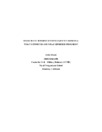Chilean intelligence after Pinochet: painstaking reform of an inauspicious legacy
| dc.contributor.author | Matei, Florina Cristiana | |
| dc.contributor.author | de Castro García, Andrés | |
| dc.date.accessioned | 2017-02-14T19:06:23Z | |
| dc.date.available | 2017-02-14T19:06:23Z | |
| dc.date.issued | 2017 | |
| dc.identifier.citation | Florina Cristiana Matei, Andrés de Castro García, "Chilean intelligence after Pinochet: painstaking reform of an inauspicious legacy," International Journal of Intelligence and Counterintelligence" v.30, (2017), pp.340-367. | en_US |
| dc.identifier.uri | https://hdl.handle.net/10945/51915 | |
| dc.description | The article of record as published may be found at http://dx.doi.org/10.1080/08850607.2017.1263530 | en_US |
| dc.description.abstract | Chile’s intelligence community has been transformed since the military dictatorship of General Augusto Pinochet ended and the country’s transition to democracy began in 1988/1989. Democratic reform of intelligence is a tedious and demanding process, given democracy’s call for transparency and accountability, which competes with an intelligence community’s vital need for secrecy. An emerging democracy, Chile has not been insulated from these challenges. As in many other developing democracies, the Chilean intelligence agencies continue to be stigmatized through association with their earlier abuses during a non-democratic past, including the ubiquitous surveillance of real and imagined enemies of the Pinochet regime, or, worse, the disappearances and killings of citizens, generally for political reasons or financial gain. Under these circumstances, Chile has been facing a paradox of how to best balance the effectiveness of its post-Pinochet intelligence agencies, long mistrusted by the Chilean people, with the transparency and accountability demanded by its citizens and politicians required the development of an intelligence culture, namely a “set of explicit and implicit attitudes and behaviors related to intelligence which influence/determine social perceptions/public opinion on intelligence in general, and the intelligence agencies in particular.” Other efforts aimed at strengthening intelligence openness and accountability, such as formal and informal oversight bodies, can help change the public’s perception of intelligence agencies. | en_US |
| dc.format.extent | 28 p. | en_US |
| dc.publisher | Taylor & Francis Group, LLC | en_US |
| dc.rights | This publication is a work of the U.S. Government as defined in Title 17, United States Code, Section 101. Copyright protection is not available for this work in the United States. | en_US |
| dc.title | Chilean intelligence after Pinochet: painstaking reform of an inauspicious legacy | en_US |
| dc.type | Article | en_US |
| dc.contributor.corporate | Naval Postgraduate School (U.S.) | en_US |
| dc.contributor.department | National Security Affairs (NSA) | en_US |





